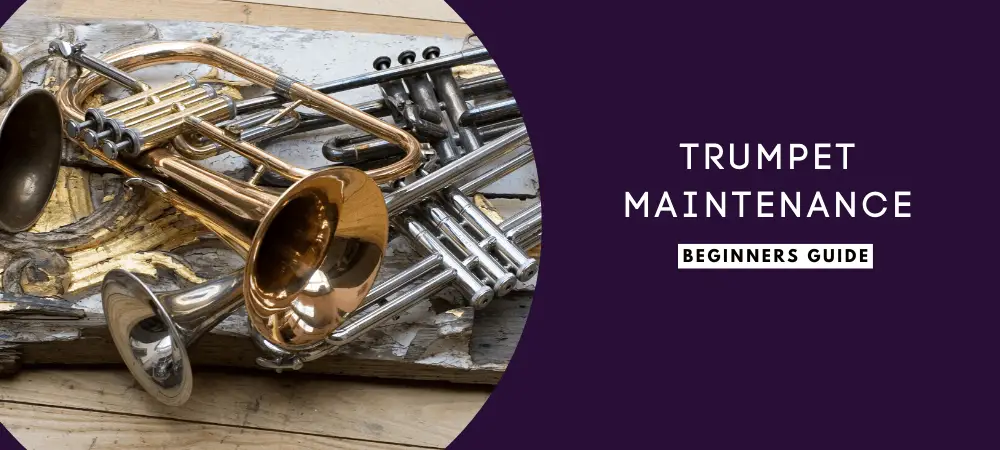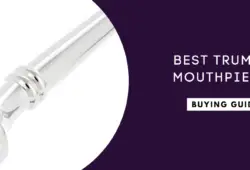Now that you have discovered your love for trumpets and have bought your first instrument for training, the joy must be immeasurable, right?
Well, congratulations!
But, not to break the bubble, your joy might be short-lived, if you don’t take the necessary precautions to ensure your gorgeous instrument is well maintained.
While it’s quite easy to maintain a trumpet, it’s how you do it that counts.
Below are some incredible tips on trumpet care and answers to the frequently asked to questions to keep you in the know-how;
Table of Contents
Trumpet Maintenance & Cleaning
Trumpet Maintenance Kit
To ensure you take as little time as possible cleaning your instrument, ensure you have everything you require in one place. You will need;
- A soft cleaning cloth
- Recommended valve oil
- A quality snake brush
- A slide grease
- A quality mouthpiece brush.
Trumpet Daily Maintenance Checklist
The warm air you release from your mouth as you play your trumpet transforms into moisture as it cools inside your trumpet.
And if you don’t wipe it off after every session, then it will end up piling up inside there leading to various issues.
To avoid this, clean it up after every session.
But, how?
- At the end of each playing session, gentle open one of the water keys and then use your mouth to blow as hard as you can.
This will force any water residue to escape through the hole.
- Also, ensure you gently press the third valve key downward, whenever you open the 3rd valve key.
- Use a soft cloth to wipe the outside body of your trumpet after each session to help remove the fingerprint marks
Leaving the fingerprints on the body for long, will end-up tarnishing your instrument, leading to a slow down in performance.
Trumpet Weekly Maintenance Checklist
- Warm some water and then add a few drops of mild liquid soap
- Get your mouthpiece brush and use it to clean the mouthpiece, to get rid of any foreign bodies and sanitizing it.
- To ensure all the slides are moving with ease, apply the slide grease to offer lubrication. (ONLY applies the grease if the slides aren’t moving easily. If they are okay, then skip this step.)
You can apply the grease as much as necessary during the week and not necessarily once per week.
Trumpet Monthly Maintenance Checklist
Did you know that instruments also require thorough cleaning as you would your house or office?
Well, they do.
Ensure you disassemble the trumpet after every few months and let them enjoy a well-deserving shower. And for this;
- Get a clean cotton towel and lay it in your bathtub or big sink or large basin, whichever place you prefer.
- Gently take off the slides from your trumpet, wipe them using a face towel or any clothing to remove the grease.
- Now, remove the valves and set them aside, you can label them for easy remembrance.
- Lay everything on your clean towel, (apart from the valves) and let the warm water flow until everything is covered.
- The instrument should be left to soak for at least 60 minutes to loosen up the dirt. For easy cleaning.
- Use the waiting time to clean the valves using the valve cleaning brush and some warm water and then set them aside to dry.
- Now, focus on the other parts and clean the tubing with a snake brush, while focusing on the lead pipe until you’re sure no debris is left.
- Rinse everything with warm water and wipe with a clean soft cloth to leave no room for spotting.
- Blow the horn to get rid of any remaining water before hanging it to dry.
- Coat the valves with the valve oil with enough oil and proceed to reassemble your instrument.
- Use your fingers to oil small sections of the slide, before inserting a tube back into place, repeat until all tubes are back in place, on both sides.
- Try playing your instrument to ensure everything is back to how it was before. If not, check where you went wrong and correct the mistake.
Trumpet Yearly Maintenance Checklist
Choose a professional music store you trust and let them check your trumpet yearly.
They will help you address the minor repairs and worn-out pads, whenever necessary.
The best time to do this is early summer to allow you to enjoy your jamming sessions in peace.
Remember, to get a price quote before you choose a store, to help you get ready financially.
You shouldn’t however, compromise on the service.
Also, if you’re renting your trumpet, check the rental program to ensure yearly maintenance is covered.
Tips about How to Keep your Trumpet in Shape
- Always ensure your instrument is safely closed in its case, whenever you aren’t using it. This will protect it from possible damages caused by frequent movements or factors within the environment.
- Avoid cleaning your instrument, until absolutely necessary. This especially applies to the thorough cleaning part.
Remember, the more you play it, the higher the possibility of exposure to dirt, so the higher the need for cleaning. But even then, once or twice a year should be fine.
But if you aren’t playing much, then it should wait some more. I mean, what is the need to clean your trumpet more than you actually play it?
- Dissembling that instrument isn’t easy, and this can cause unnecessary damage if not handled effectively.
So, if you aren’t sure of what you’re supposed to do, engage an expert or let a friend help out. It’s cheaper than having to replace a trumpet.
- If yours is a Getzan trumpet, always leave the plastic retainer intact. DON’T REMOVE IT.
It should stay in place to prevent the sliding off of the fast third slide.
- Avoid polishing your trumpet. It isn’t necessary, but if you must, then use a silver cleaning cloth for silver-plated trumpets.
Polishing speeds tarnishing and that’s the last thing you would want to do.
- Always ensure your instrument is attended to by a professional wind instrument technician. And that’s when it requires necessary repairs.
Don’t attempt anything yourself or your friend and absolutely not the guy from the random repair shop down the street.
- You should NEVER let your instrument stand on its bell. If it does, chances of falling over are high and it can easily get damaged.
Instead, let it stay in the case whenever not in use, no matter how much you want to show it off to visiting friends.
- Those regular cloths and wooden chopsticks you have been seeing others use on their instruments aren’t part of the trumpet’s cleaning kit. They can clean perfectly as well.
- Avoid putting anything else in your trumpet’s case. Be it your favorite music notes, etc. The extra content in the case can cause pressure to the valves as you force-close the case.
- Any time you plan on transporting your trumpet, ensure the latches are secure before you proceed.
- NEVER try to remove stuck mouthpieces, slides or caps. This could be due to lack of oiling and you should take your instrument to a technician immediately for professional removal.
FAQs About Trumpet Maintenance
How often should you clean a trumpet?
You should clean a trumpet only when necessary.
Most of the time, allow yourself to be guided by the frequency of use.
For instance, if you use it often, then thorough cleaning once or twice a year should be fine.
But if not, then once or twice every two years is okay.
Note; this doesn’t include the weekly and monthly maintenance routines (as mentioned earlier)
How do you lubricate a trumpet?
Not lubricating the slides of your trumpet can lead to immense wielding of the tubes.
To avoid this, grease them accordingly by first identifying the fast and slow slides.
Grease the slow slides and oil the faster ones.
Here’s how to do it;
Slow slides
- Carefully remove the slides before putting slide grease on them.
- Use your fingers to spread the grease and then replace the slide tube.
- Now, use your fingers (again), to wipe-off the extra grease and apply it on the next grease.
- Repeat the process with the next slide.
https://www.youtube.com/watch?v=0SCSM58SbEA
Faster Slides (normally 1stand/3rd valve)
- Oil the 1st and/or 3rd valve of your trumpet using drops of oil on each side.
- Afterward, press down the related valve so that the slide can move
How do you fix a slow trumpet valve?
A slow trumpet valve is usually a result of exposure to too much friction without proper oiling.
The best way to deal with this is by oiling it;
- Let your instrument rest on a flat surface
- Slowly unscrew the valve and remove it from the trumpet’s body.
Remember to do it carefully without applying force one step at a time.
- Pour several drops of your preferred oil into the shaft.
- Now push back the valve and press it into place.
- The valve should now work properly with ease of movement.
Can I use olive oil on my trumpet valves?
No, you shouldn’t.
This is because olive oil tends to be much heavier than valve oils.
It will rancid pretty fast and then end-up sticking around your horn
If you don’t have your oil with you, you can instead opt for baby oil, as its light, to solve the problem before purchasing the correct oil as soon as possible.
Can you use Vaseline as slide grease?
Using Vaseline as a short-term solution is just fine.
But if you use it for long, then it will end up gumming up in your instrument.
And while this can’t cause any serious harm, you will have to disassemble it for cleaning more often, which isn’t recommendable.
It will also not work as well as your trumpet’s slide oil would.
So, if you can afford the recommended oil, use it and avoid all this hassle.
Why does my trumpet sound muffled?
This is probably because of the extra air that remains after the vibrations of your trumpet as you play.
And because of this, some of that air comes out through the opening of your instrument’s mouth, professionally known as aperture embouchure.
While this happens, your soft lips miss the vibrations hence the muffled sound that comes out of the bell of your instrument.
This issue can be solved, so don’t freak out.
How can I improve my trumpet tone?
There are many ways in which you can improve your trumpet’s sound. And they include;
- First know what you want to sound like when you play and once you do, take time listening to multiple trumpet players in your genre play. This will help you focus on sounding like the great tones you listen to.
- Don’t repress the resonance mechanism. Always let it remain open to allow free movement.
In fact, it should depict everything as well relaxed.
Here’s a video to help you understand better;
- Indulge in various trumpet tone quality exercises.
Yes, you have to exercise to get it right.
These exercises teach you how to use less energy to achieve excellent results.
And you first have to listen, feel, and find the center notes.
Afterward, use those tunes to set the notes into “easy” speaking mode.
Watch this YouTube video for an understanding of what I mean;
Note; Remember, even as you use the softness in the notes, you should play with a great sound.
And this means that your tone should be powerful enough to project and carry what you want to come out.
Don’t whisper, but maintain a clear and clean tone.
Also, focus on beginning each tone clearly.
Conclusion
It would be a waste of money if you purchase a very expensive trumpet but get lazy on maintaining it.
You will end up spending more money on repair than you could in simple frequent maintenance habits.
So, if you just bought your 1st trumpet and are still in awe of how beautiful it appears, you should think of how to maintain that classy look to last you for a long-time.
Or even allow you to pass it on to the next generation.
The above trumpet maintenance tips are for you, our reader. So, make use of them to make your instrument playing journey smooth.
Also, don’t forget to ask us any questions if you feel lost.




